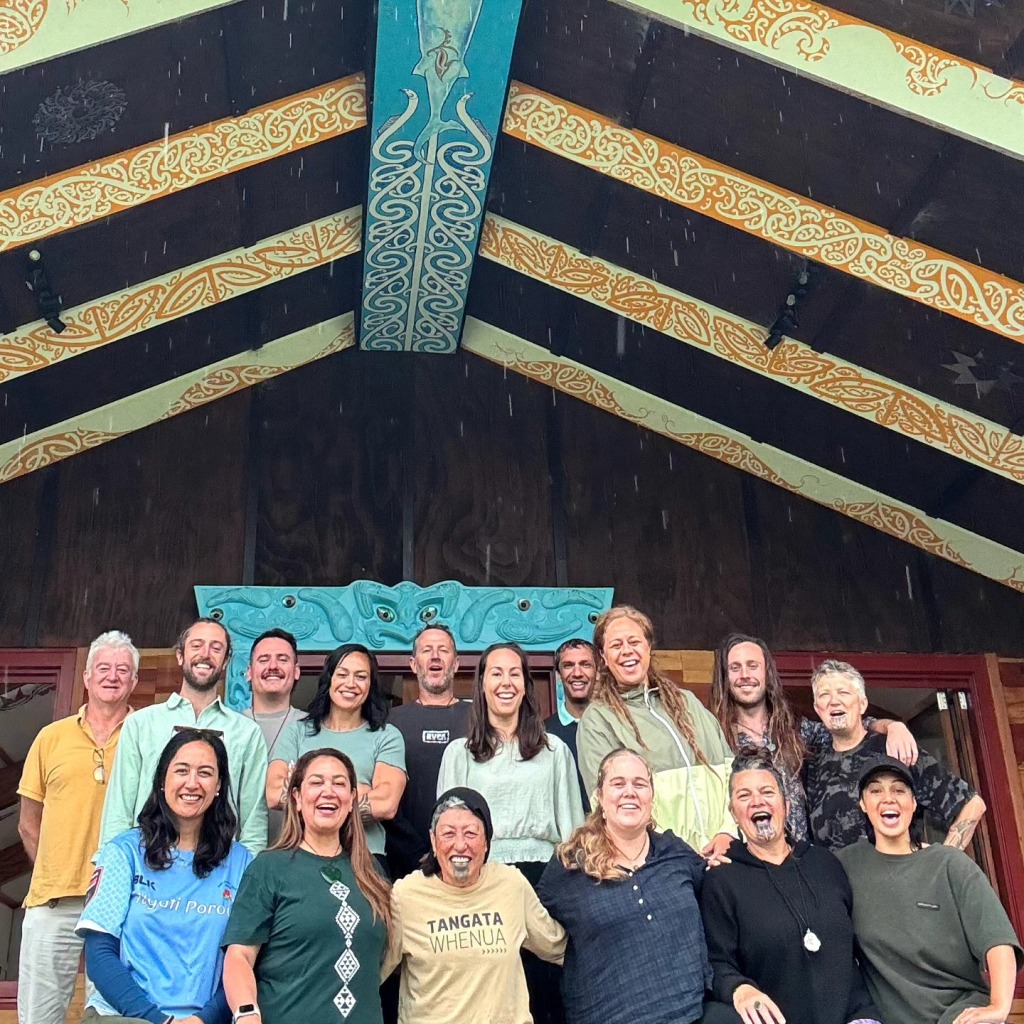Over a weekend in the middle of November, a multidisciplinary team of health professionals, rongoā practitioners, artists, academics, and interested whānau and community members, met at Rangiwaho Marae in Tairāwhiti to finalise the Tū Wairua project plans for a clinical trial in 2024.
Those present acknowledged recent project milestones. Project partner, Rua Bioscience recently obtained the first ever license to cultivate Psilocybe weraroa to support the kaupapa.
“We aim to expand this license in future to include other Psilocybe species that are indigenous and endemic to Aotearoa” said project coordinator Will Tait-Jamieson.
The signing of a funding agreement with the New Zealand Health Research Council (HRC) was another major achievement and has confirmed funding for the next 18 months.
“The funding will support the project team to develop and deliver a clinical trial using a tikanga-based psychedelic therapy in healthy participants, and expand our knowledge of New Zealand Psilocybe species and their psychoactive compounds” said Mr Tait-Jamieson. ”It also supports the training of local health practitioners and kaitieki to facilitate psychedelic therapy.”
A key requirement for any clinical trial is product consistency, so understanding the presence, quantity, and proportions of psychoactive compounds within New Zealand’s Psilocybe species will be essential to produce a consistent dose that is safe to administer in therapeutic settings. Tia Haira and Dr Aimee Lloyd delivered a presentation on behalf of project partner – the Institute of Environmental Science and Research – on the methods they aim to use to better understand the chemical composition of psychoactive compounds within Psilocybe species. Work is underway to develop methods to detect and quantify psilocybin, psilocin, and other bioactive compounds present in New Zealand’s Psilocybe species.
“A crucial component of our clinical trial is ensuring the trial is conducted in a manner that keeps participants safe and supported, and their personal agency is upheld” said clinical lead Dr Patrick McHugh.
Because Psilocybe mushrooms are designated a Class A drug under the Misuse of Drugs Act 1975 (MoDA), obtaining approvals is not a straightforward process. The project team was pleased to invite medical researchers Associate Professor Suresh Muthukumaraswamy and Dr Anna Forsyth from the University of Auckland to walk through the steps of obtaining ethical approval. The pair of experienced clinical researchers are guiding the project team through the various documentation and committee approval processes required.
Much discussion was generated regarding the compound the trial intends to administer. While the long-term preference is for a substance that is natural, and locally-sourced, expectations from medicine regulators not used to approving rongoā could pose significant delays to the start of clinical trials.
“To progress this first clinical trial with healthy participants while we explore and develop tikanga and kawa, we are discussing the supply of psilocybin capsules with an international supplier” said Jody Toroa, the project leader from Rangiwaho Marae. “Their capsules are derived from powdered, cultivated mushrooms and meet pharmaceutical quality standards which should make it easier for the ethics committee and Medsafe to approve than whole mushrooms. We realise there is a risk that they then expect us to always use GMP quality products but we will work with them on any concerns once we have evidence of consistency in the mushrooms Rua Bioscience produces under the cultivation licence.”
The New Zealand Drug Foundation’s policy director, Dr Jacek Kolodziej gave a presentation on drug-checking which was officially legalised in New Zealand in 2021, and how the practice has contributed to reducing drug-related harm.
“Drug checking is a great health intervention that helps people have a conversation about ways to use a substance safer and know what is in a drug they are planning on taking.” said Dr Kolodziej. “There may be ways that drug checking could help this project as well.”
From a tikanga Māori perspective, the practice of rongoā is embedded within practices of kaitiakitanga and rangatiratanga within each rohe, so locally sourced mushrooms is the goal.
Dr Bevan Weir, a mycologist with another project partner, Manaaki Whenua – Landcare Research, provided a survey of the various Psilocybe species present in Aotearoa, and what we currently know about their phylogeny or whakapapa. Dr Weir’s research suggests that P. weraroa, and P. makarorae are endemic to Aotearoa ie., only found here.

While the team expects there is good community knowledge about what species grow within the Rangiwaho rohe, there is little information available publicly. Citizen science websites such as iNaturalist.org provide little information within the area south of Gisborne. The team hopes to learn a lot from the community users who have expressed interest in our project.
Lastly, the project continues to explore regulatory pathways that will make it safer and easier for rongoā and health practitioners to access psychedelic medicines for use in therapy, and for kaitiaki to access without unreasonable constraint, taonga species that have the potential to improve the health and wellbeing of whānau. Researchers and legal experts are looking at regulations in jurisdictions around the world and domestic precedents that may be appropriate to inform new regulatory pathways for Māori and others utilising the taonga. A final report on regulatory options is expected in late January which will cover Aotearoa’s current regulatory framework concerning psychedelic medicine, as well as case studies where allowances have been made for indigenous customary and/or sacramental practices.
The initial ethics application for the clinical trial should be completed prior to Christmas for submission to the Health & Disabilities Ethics Committee in January with a goal of undertaking the first phase of the trials in mid-2024. The first half of 2024 will focus on training local health practitioners and Kaitieki in psychedelic therapy, and developing the associated kawa and tikanga to be integrated into the experience, making this the first trial of its kind in Aotearoa.

Leave a comment